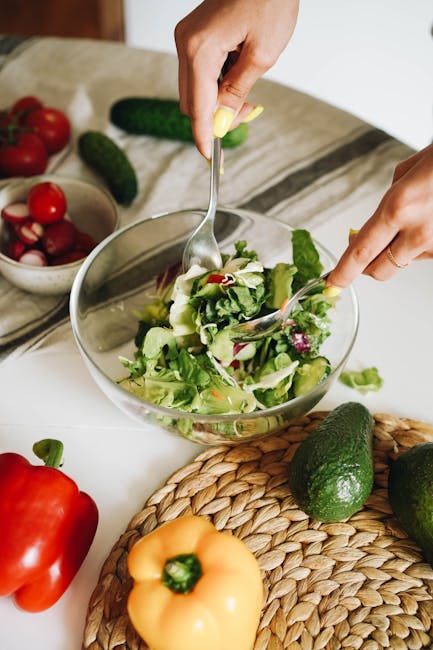2025 Culinary Degree Trends: Mastering Diet-Specific Recipes for Success
In the dynamic world of culinary arts, staying ahead of the curve is essential for success. As we look towards 2025, the culinary landscape is rapidly evolving, with a growing emphasis on diet-specific recipes. Whether you are a seasoned chef or a budding culinary enthusiast, mastering the art of creating dishes tailored to specific diets is becoming increasingly important. In this article, we will explore the emerging trends in culinary degrees and how mastering diet-specific recipes can pave the way for a fulfilling and prosperous career in the culinary industry.
The Rise of Diet-Specific Cooking
In recent years, there has been a significant shift towards more mindful eating habits and a focus on health and wellness. As a result, there is a growing demand for diet-specific recipes that cater to various dietary preferences and restrictions. Whether it’s gluten-free, plant-based, keto, or paleo, individuals are increasingly seeking out recipes that align with their specific dietary needs.
Culinary schools are taking notice of this trend and are incorporating diet-specific cooking into their curriculum. Students are now learning how to adapt traditional recipes to accommodate different diets, giving them a competitive edge in the industry. By mastering the art of diet-specific cooking, culinary graduates are well-positioned to meet the demands of today’s health-conscious consumers.
The Benefits of Mastering Diet-Specific Recipes
Mastering diet-specific recipes offers numerous benefits for aspiring chefs and culinary professionals. Here are some of the key advantages:
1. Meeting Consumer Demand
With more people adopting specific diets for health, ethical, or environmental reasons, there is a growing demand for dishes that cater to these preferences. By mastering diet-specific recipes, chefs can cater to a wider audience and attract customers who may have otherwise overlooked their establishment.
2. Standing Out in a Competitive Industry
The culinary industry is highly competitive, with new restaurants and food businesses constantly entering the market. By specializing in diet-specific cooking, chefs can differentiate themselves from their competitors and carve out a unique niche for their culinary creations.

3. Enhancing Culinary Skills
Adapting traditional recipes to meet the requirements of a specific diet requires creativity, skill, and knowledge. By mastering diet-specific recipes, chefs can enhance their culinary skills and broaden their repertoire, making them more versatile and adaptable in any kitchen setting.
Culinary Degree Programs Embracing Diet-Specific Cooking
As the demand for diet-specific recipes continues to grow, culinary degree programs are adapting their curriculum to meet the needs of aspiring chefs. Here are some of the ways in which culinary schools are incorporating diet-specific cooking into their programs:
1. Specialized Courses
Many culinary schools now offer specialized courses in diet-specific cooking, where students can learn how to create dishes tailored to specific diets such as vegan, gluten-free, or low-carb. These courses provide hands-on experience and practical skills that can be applied in a professional kitchen setting.
2. Guest Lectures and Workshops
Culinary schools often invite guest chefs and nutritionists to conduct workshops and lectures on diet-specific cooking. These sessions provide students with valuable insights and expertise from industry professionals, allowing them to gain a deeper understanding of the principles behind diet-specific recipes.
3. Internship Opportunities
Internships are a crucial part of culinary education, offering students the chance to gain real-world experience in a professional kitchen environment. Many culinary schools have partnerships with restaurants and catering companies that specialize in diet-specific cooking, providing students with valuable hands-on training and networking opportunities.
4. Research and Development Projects
Some culinary degree programs include research and development projects focused on creating innovative diet-specific recipes. These projects challenge students to think creatively and experiment with different ingredients and cooking techniques, helping them hone their skills and expand their culinary horizons.
Mastering Diet-Specific Recipes: Tips for Success
Whether you are a culinary student or a professional chef looking to expand your skill set, mastering diet-specific recipes can set you apart in the competitive culinary industry. Here are some tips to help you succeed in creating delicious and nutritious dishes tailored to specific diets:

1. Understand the Dietary Guidelines
Before diving into diet-specific cooking, take the time to research and understand the guidelines and principles behind each diet. Whether it’s avoiding gluten, incorporating more plant-based ingredients, or reducing carbohydrates, knowing the basics will help you create recipes that meet the dietary needs of your customers.
2. Experiment with Ingredients
One of the joys of cooking is experimenting with different ingredients and flavors. When creating diet-specific recipes, don’t be afraid to think outside the box and try new ingredients that align with the dietary requirements. Get creative with plant-based proteins, gluten-free grains, and sugar alternatives to add variety and depth to your dishes.
3. Focus on Flavor and Texture
Just because a dish is diet-specific doesn’t mean it has to compromise on flavor and texture. Pay attention to seasoning, herbs, and spices to enhance the taste of your dishes. Experiment with cooking techniques to achieve the desired texture, whether it’s crispy, creamy, or tender, to create a well-rounded and satisfying culinary experience.
4. Seek Feedback and Refine Your Recipes
Cooking is a continuous learning process, and feedback is key to improving your skills. Don’t be afraid to ask for feedback from customers, colleagues, or instructors on your diet-specific recipes. Use constructive criticism to refine your dishes and make adjustments to better meet the preferences of your audience.
5. Stay Updated on Food Trends
The culinary industry is constantly evolving, with new food trends and dietary preferences emerging regularly. Stay informed about the latest developments in diet-specific cooking by following food blogs, attending culinary events, and exploring new culinary techniques. Keeping up-to-date with food trends will help you stay relevant and innovative in your culinary creations.
Conclusion
As we look towards 2025, mastering diet-specific recipes is becoming a valuable skill for aspiring chefs and culinary professionals. By understanding the principles behind different diets, experimenting with ingredients, and focusing on flavor and texture, chefs can create delicious and nutritious dishes that cater to the growing demand for diet-specific cooking. With culinary degree programs embracing this trend and offering specialized courses and training opportunities, aspiring chefs have the resources they need to succeed in the competitive culinary industry. By staying informed, experimenting with new techniques, and seeking feedback to refine their recipes, chefs can position themselves for a successful and fulfilling culinary career in the ever-evolving world of food.


